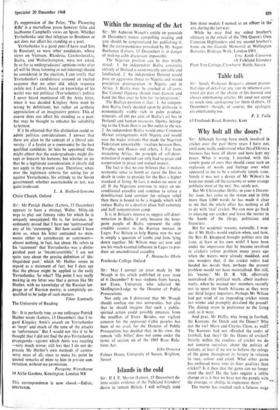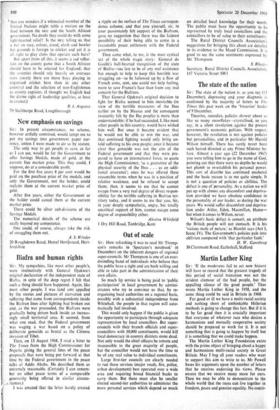Why bolt all the doors?
Sir: Although having been much involved in cricket over the past thirty years I have not, until now, really understood what this d'Oliveira
business has been all about and have kept my peace. What is wrong, I puzzled, with this
simple game of ours that should cause such an explosion of words and feelings over what appeared to me to be a relatively simple issue.
Surely it was not a device of Mr Wilson's to keep our minds off the economy or some strange publicity stunt of the MCC. No. surety not.
But Mr Christopher Hollis, in your 6 Decem- ber issue, has come to the rescue and in little more than 1.000 words he has made it clear to me that the whole affair has nothing at all to do with 'real' cricket. We can now go back
to enjoying our cricket and leave the matter in the hands of the clergy, politicians and financiers.
But for academic reasons, naturally, I won- der if Mr Hollis would explain when, and how, the Rev D. Sheppard brought politics into the issue, at least at his own wish? I have been under the impression that he became involved in cricket's colour problem many years ago when the waters were already muddied, and one wonders that, if the cricket rulers had heeded his words then, perhaps the present problem would not have materialised. But still, his 'enemy,' Mr D. R. Silk, effectively neutralised this political myth, albeit inadver- tently, when he warned MCC members recently not to upset the South Africans as they were
our third largest importers. Perhaps Mr Wilson had got wind of an impending cricket storm last winter and promptly devalued the pound! The shining straw in preference to the living soul, as it were.
And pray, Mr Hollis, why bring in football, the Koreans, the Dutch and the Danes? Why .
not the UN? Marx and Charles Clore, as well? The Koreans had not offended the codes of football, had they? Or the Danes of cricket?
Strictly within the confines of cricket we do not concern ourselves about the politics of
nations, at least if we are to believe the eulogy of the game throughout its history in relation to race, colour and creed. What other game
has enthused more over its finer qualities than cricket? Is it then that the game can no longer stand the test? Do the laws require a subtle change or is it that we have not the people with the courage, or ability, to implement them? '444- The matter has reached such a fatuous stage ' that one wonders if a whimsical member of the United Nations might table a motion on the feud between the MCC and the South African government. No doubt they could do with some light-hearted relief! Is the MCC telling us that a bar on race, colour, creed, cloth and bowler hat grounds is foreign to cricket and yet it is all right to play clubs that operate such bars?
But apart from all this, it seems a sad reflec- tion on the county game that a South African should have to be selected for England; that the counties should rely heavily on overseas stars (surely there are more boys playing in organised cricket here than in any other country) and the selection of non-Englishmen as county captains. (I thought we English had the divine right of leadership qualities, at least in cricket.) B. I. Angrave 79 Shelthorpe Road, Loughborough



































 Previous page
Previous page